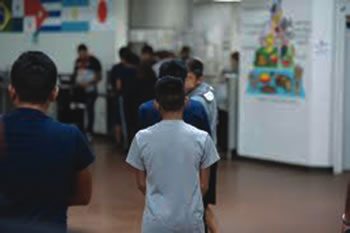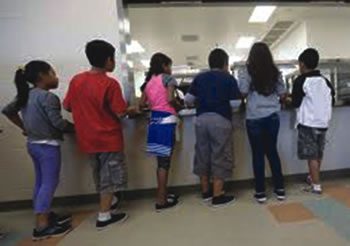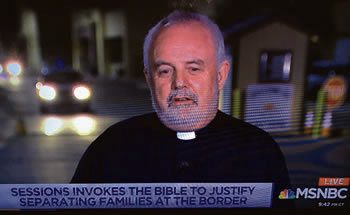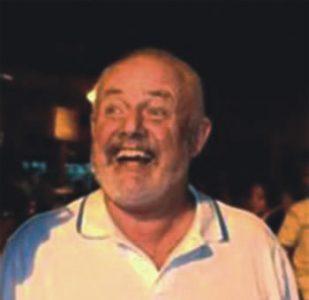In My Prison Ministry There Are No Criminals
I have not been more passionate about any other ministry in my many years working in five countries than this walking with unaccompanied minors, aged 11 to 17, from Guatemala, Honduras, Salvador and now, Nicaragua. I am surprised what swirls up from deep within me and only recently have I gained a clue as to what it is and why.
In Peru, I was in part-time prison ministry. But my preference and passion does not come from that. Rather, it comes from another lived experience. In the bad old days when I was young, I spent 5 years of high school in a boarding institution and my 8-year seminary training far away from the crazy world. For me, quite frankly, it was awful! I don’t know how I survived! It must have been God’s grace!
Those experiences draw me to those kids, who, like little birds in a cage, yearn to be free. They are great kids too, boys and girls. The drought-victim Guatemalans are small, short and stumpy. Most of them are indigenous and bilingual, Spanish and their own dialect. They are mainly from the countryside and are very religious. There is nothing more moving than to see 20 or 30 of them kneeling before the table on which I have celebrated Mass and praying out loud, all together in their own dialect, devoted, heads bent, oblivious to anything outside of them. And, of course, unembarrassed and without shame.
 The Hondurans, who are mainly city kids, both girls and boys, are taller and more sophisticated. The Salvadorians, equally as tall, are a little quieter, perhaps more reserved because of the gang wars and violence of their country. They are very proud of their martyr Archbishop Oscar Romero, ‘san Romero’, as they call him, canonised by Pope Francis last year. The Nicaraguans, those few that escape their homeland, say that the "government wants to recruit them to fight against the people". In Texas, there are many refuge centres for minors. Technically, they are detention centres where they are processed to then join their sponsors further north, usually family members. The process is rather rigorous. It can take some six weeks to two months for those who are lucky. In the Diocese of Brownsville there are more than 12 such centres. I have access to most of them, although Casa Padre, the Father’s House, with 1,300 boys, is one of the closer ones. The other centres would have some 300 to 500 young people.
The Hondurans, who are mainly city kids, both girls and boys, are taller and more sophisticated. The Salvadorians, equally as tall, are a little quieter, perhaps more reserved because of the gang wars and violence of their country. They are very proud of their martyr Archbishop Oscar Romero, ‘san Romero’, as they call him, canonised by Pope Francis last year. The Nicaraguans, those few that escape their homeland, say that the "government wants to recruit them to fight against the people". In Texas, there are many refuge centres for minors. Technically, they are detention centres where they are processed to then join their sponsors further north, usually family members. The process is rather rigorous. It can take some six weeks to two months for those who are lucky. In the Diocese of Brownsville there are more than 12 such centres. I have access to most of them, although Casa Padre, the Father’s House, with 1,300 boys, is one of the closer ones. The other centres would have some 300 to 500 young people.
In the centres we place emphasis on reconciliation. For these young people, confession is like a rite of passage. In captivity they are treated well, and they have time to reflect on their lives as they await the new life they hope to lead further north. Their sharing is heart-felt and profound. You can see them heaving a sigh as they walk out on a lighter step. They don’t speak of the arduous and often violent trip they have made over thousands of miles, but rather of their failures in family back home, their need of God at this moment, and a hope in their hearts that they will get to live a new life. The depth of these young people and their utter sincerity and faith in God is awesome.

Our Parish, San Felipe, has itself become a refuge centre for some of these youngsters. Almost daily, some 30 to 60 are bussed from one centre or another for Mass in the morning or afternoon visits, for a breath of fresh air and a change of scenery. They are carefully supervised. One escaped last year. He had so much adrenaline in him as he shot for the door that I swear the door of the church opened on its own!
After the morning Mass or during the afternoon visit, we give them some food, different from food at the centre, including a coke, which is coveted and enjoyed immensely. They also receive a simple wooden cross as a momento of their first visit to San Felipe, and a rosary, both of which are greatly valued.
On a Sunday, at Mass full of people, the community so much loves to have these young people there. They are applauded while the choir sings and ‘welcomes the stranger’. The parish, although poor, always seems to have the wherewithal for food, the Coca-Cola, and the cash to buy crosses and rosary beads. What we lack is capital to give each a Catholic paperback Bible or even a Catholic New Testament -- something they would so dearly love to have.
So, this is a very special sort of prison ministry. A prison ministry without criminals. Their only so-called crime is for being minors and wanting a better future for themselves, and wanting to help their families. They don’t dwell on their month’s journey up through Mexico. But one of them, with a heavy heart, spoke of a companion who died of dehydration on the way; and another praised the refuge centre’s care for the unaccompanied minor, who said he was chased by alligators as he crossed a river swamp in Tampico, Mexico, and had all his clothes ripped off him by members of Las Zettas gang. But in the centre he feels safe. Here in San Felipe de Jesus, they feel that way too.

 Entries(RSS)
Entries(RSS)